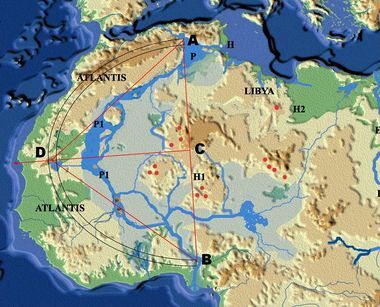The Modern Search for Atlantis

The Atlantis Puzzle
National Geographic (2024)
Film Review
The Greek philosopher Plato first mentions Atlantis in the dialogues Timaeus and Critias 2400 years ago. According to Plato, it was ruled by 10 kings descended from Poseidon (the Greek sea god) and enjoyed immense wealth and large decadent cities. After its massive army and navy swept across North Africa and Egypt, it invaded Italy. Following their defeat by Athens, who also liberated Egypt and other North Africans subjugated by Atlanteans, a horrific earthquake and floods caused Atlantis to disappear under the ocean.
Plato claimed this history originated with information Solon* received from an Egyptian priest name Sais in 1600 BC. According to Sais, Athens built a number of civilizations between 10,000 BC and 1600 BC, which were all destroyed by wildfires, floods and natural disasters. Owing to the loss of their original written language, these events were lost to historical memory.
Historians have debated for centuries whether Atlantis was real and where it was located. Based on a re-translation of the ancient Greek, modern Greek linguist Serantitis believes Plato was describing an area in the Western Sahara between around 10,000 and 30,000 BC. During this period the Sahara was lush green savanna with12,000 lakes, five river systems and wetlands.
According to the Greek historian Herodotus, at the time of “Adalantis” northern Africa was divided into East and West Ethiopia. This is reflected in Africa’s linguistic divisions, with the East Ethiopians speaking Nilo Saharan and the West Ethiopians speaking a Niger Congo language**
According to archeological evidence, around 10,000 BC the inhabitants of West Ethiopia were hunter gatherers who engaged in trade and warfare and consumed wheat from the Middle East. Other evidence shows the first humans arrived on the island of Crete 130,000 years ago and Greeks engaged in sea trade 14,000 years ago.
Serantitis believes the fate of Atlantis in Plato’s dialogues was wrongly translated as “submerged.” He feels it more likely it “sank” or “settled,” owing to earthquakes, volcanoes and/or landslides, and a combination of liquefaction and massive influx of water from the inland seas.
*Solon was an Athenian lawmaker credited with founding Athens’ democracy.
**Some anthropologists believe modern Mauritanians are descendants of Atlanteans.
The Most Revolutionary Act
- Stuart Jeanne Bramhall's profile
- 11 followers



